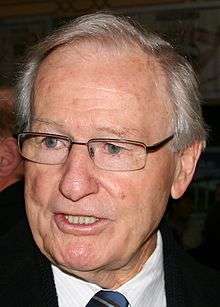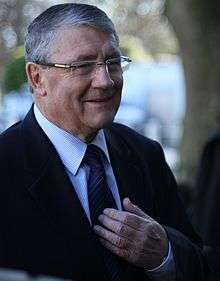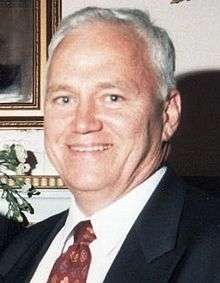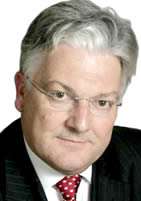New Zealand general election, 1996
| | |||||||||||||||||||||||||||||||||||||||||||||||||||||||||||||||||||||||||||||||||||||||||||||||||||||||||||||||||||||||||||
| |||||||||||||||||||||||||||||||||||||||||||||||||||||||||||||||||||||||||||||||||||||||||||||||||||||||||||||||||||||||||||
| |||||||||||||||||||||||||||||||||||||||||||||||||||||||||||||||||||||||||||||||||||||||||||||||||||||||||||||||||||||||||||
| |||||||||||||||||||||||||||||||||||||||||||||||||||||||||||||||||||||||||||||||||||||||||||||||||||||||||||||||||||||||||||
The 1996 New Zealand general election was held on 12 October 1996 to determine the composition of the 45th New Zealand Parliament. It was notable for being the first election to be held under the new mixed-member proportional (MMP) electoral system, and produced a parliament considerably more diverse than previous elections. It saw the National Party, led by Jim Bolger, retain its position in government, but only after protracted negotiations with the smaller New Zealand First party to form a coalition. New Zealand First's position as "kingmaker", able to place either of the two major parties into government, was a significant election outcome.
Background
Changes mid-term
In the 1993 election, the National Party and the Labour Party had won 50 and 45 seats, respectively. The Alliance and the New Zealand First party had each won two seats. In the approach to MMP, however, there had been considerable rearrangement in parliament, with three new parties being established. As such, the situation just before the 1996 election was markedly different from the situation that had been established at the 1993 election.
| Party | Won at 1993 election | By time of 1996 election | Reasons for change |
| National | 50 | 41 | Defection of 9 MPs |
| Labour | 45 | 41 | Defection of 4 MPs |
| United | - | 7 | Formed by 4 former National MPs and 3 former Labour MPs |
| NZ First | 2 | 5 | Initial MPs joined by 2 former National MPs and one former Labour MP |
| Alliance | 2 | 2 | No change |
| Conservative | - | 1 | Founded by 2 former National MPs; one later became an independent |
| Christian Democrats | - | 1 | Founded by a former National MP |
| Independents | - | 1 | Ross Meurant, a former National (and briefly Conservative) MP |
Electoral redistribution
The 1996 election was notable for the significant change of electorate boundaries, based on the provisions of the Electoral Act 1993.[1] Because of the introduction of the MMP electoral system, the number of electorates had to be reduced, leading to significant changes. Many electorates were abolished, with their territories being incorporated into completely new electoral districts. More than half of the electorates contested in 1996 were newly constituted, and most of the remainder had seen significant boundary changes. Wanganui was renamed as Whanganui. In total, 73 electorates were abolished, 29 electorates were newly created, and 10 electorates were recreated, giving a net loss of 34 electorates.
- South Island
Since the 1967 electoral redistribution, the South Island had its number of general electorates fixed at 25.[2] For the 1996 election and onwards, the number of South Island electorates is fixed at 16. The number of electors on the general roll of the South Island divided by 16 gives the target size for North Island and Māori electorates; this is referred to as the South Island quota.[3]
The electorates of Avon, Awarua, Christchurch North, Clutha, Dunedin West, Fendalton, Lyttelton, Marlborough, Rangiora, Selwyn, St Albans, St Kilda, Sydenham, Tasman, Timaru, Waitaki, Wallace, West Coast, and Yaldhurst were abolished in the South Island. Six existing electorates (Christchurch Central, Dunedin North, Invercargill, Nelson, Otago, and Rakaia) were kept. Seven electorates (Aoraki, Banks Peninsula, Clutha-Southland, Ilam, Kaikoura, Waimakariri, and West Coast-Tasman) were newly formed. Three electorates (Christchurch East, Dunedin South, and Wigram) were recreated.
- North Island
Based on the calculation described above, the target size for North Island electorates resulted in 44 of them being required.
The electorates of Birkenhead, East Coast Bays, Eastern Bay of Plenty, Eastern Hutt, Eden, Far North, Franklin, Gisborne, Glenfield, Hastings, Hauraki, Hawkes Bay, Henderson, Heretaunga, Hobson, Horowhenua, Howick, Island Bay, Kaimai, Kaipara, Kapiti, King Country, Manawatu, Matakana, Matamata, Miramar, Mt Albert, Onehunga, Onslow, Otara, Pahiatua, Panmure, Papakura, Papatoetoe, Pencarrow, Porirua, Raglan, Remuera, Roskill, Taranaki, Tarawera, Te Atatu, Titirangi, Tongariro, Waikaremoana, Waikato, Waipa, Waitotara, Wellington-Karori, and Western Hutt were abolished in the North Island. Twenty existing electorates (Albany, Auckland Central, Hamilton East, Hamilton West, Mangere, Manurewa, Napier, New Lynn, New Plymouth, North Shore, Pakuranga, Palmerston North, Rangitikei, Rotorua, Tamaki, Tauranga, Wairarapa, Waitakere, Whanganui, and Whangarei) were kept. Seventeen electorates (Mahia, Owairaka, Waipareira, Karapiro, Ohariu-Belmont, Port Waikato, Epsom, Hutt South, Mana, Manukau East, Maungakiekie, Northcote, Northland, Rimutaka, Rongotai, Taranaki-King Country, and Tukituki) were newly formed. Eight electorates (Bay of Plenty, Coromandel, Hunua, Otaki, Rodney, Taupo, and Wellington Central) were recreated.
- Māori electorates
All four existing Māori electorates (Eastern Maori, Northern Maori, Southern Maori, and Western Maori) were abolished. The calculation described above resulted in five Māori electorates being required; these were Te Puku O Te Whenua, Te Tai Hauauru, Te Tai Rawhiti, Te Tai Tokerau, and Te Tai Tonga.
- List seats
The House of Representatives was to have 120 seats, of which 65 were filled through electorate MPs (16 from South Island electorates, 44 from North Island electorates, and 5 from Māori electorates). This left 55 list seats to be filled. An outcome of the election was that no overhang seats were required.
The election
The date of the 1996 election was 12 October; it was brought forward slightly to avoid the need for a by-election following the resignation of Michael Laws, as a by-election is not needed if there will be a general election within 6 months of a seat being vacated.
Of the 2,418,587 people registered to vote, 88.3% turned out to vote. The turnout was a slight improvement on the previous two elections, but still slightly lower than what would have been expected during the 1980s. The number of seats being contested was 120, an increase of 21 from the previous election, but as 55 of the new seats were for list candidates, the number of electorates was reduced considerably and many electorates had their boundaries amended or were abolished. While the number of general electorates decreased from 95 (1993) to 60 (1996), the number of Māori electorates increased from 4 to 5.
In the election 842 candidates stood, and there were 21 registered parties with party lists. Of the candidates, 459 were electorate and list, 152 were electorate only, and 231 were list only. 73% of candidates (616) were male and 27% (226) female.[4][5]
Summary of results
The 1996 election eventually saw a victory for the governing National Party, which won around a third of the vote. The opposition Labour Party won slightly less. The election, however, was not decided by the comparative strengths of the major parties - rather, the smaller New Zealand First party, which won 17 seats, including 5 Māori seats won by the Tight Five, and was placed in the position of "kingmaker", able to provide the necessary majority to whichever side it chose. Although predicted by many to ally with Labour on 10 December 1996, New Zealand First leader Winston Peters chose to form a coalition with National, thus preserving Prime Minister Jim Bolger's administration.[6]
The 1996 election effectively showcased the difference made by the new electoral system. The Alliance and New Zealand First, both of which held two seats each in the old parliament, increased their representation to 13 and 17 seats, respectively, as a result of the change. The new ACT New Zealand also benefited, taking eight seats. The MMP system did not, however, save the United New Zealand party - United was virtually wiped out, retaining only a single seat. The Conservative Party fared even worse, failing to remain in parliament at all.
However, Labour Party did manage to retain its status as among the top-two parties, as polls in the 1993-1996 period had shown Labour Party was in danger of being overtaken by the Alliance or New Zealand First. Labour Party's success was caused largely by its leader Helen Clark being seen as having convincingly won the election debates.
Also notable in the 1996 election campaign was the Christian Coalition, an alliance of the Christian Democrats and the Christian Heritage Party. Although the party had briefly crossed the 5% threshold in some polls, it gained only 4.33% at the election, and therefore did not qualify for parliamentary representation. With the exception of the Maori Ratana movement, this is the closest that an overtly religious party has come to winning representation in parliament.
Voters were prepared with MMP to vote for minor party candidates with their electorate vote, hence in a number of electorates won by National or Labour the other major party candidate came third or even fourth; previously the two top polling candidates were almost always National and Labour.
Detailed results
Parliamentary parties
| party | votes | % of votes | seats | |||||
|---|---|---|---|---|---|---|---|---|
| % | change | electorate | list | total | change | |||
| National | 701,315 | 33.87 | -1.18 | 30 | 14 | 44 | -6 | |
| Labour | 584,159 | 28.19 | -6.49 | 26 | 11 | 37 | -8 | |
| NZ First | 276,603 | 13.35 | +4.95 | 6 | 11 | 17 | +15 | |
| Alliance | 209,347 | 10.10 | -8.11 | 1 | 12 | 13 | +11 | |
| ACT | 126,442 | 6.10 | +6.10 | 1 | 7 | 8 | +8 | |
| United | 18,245 | 0.88 | +0.88 | 1 | 0 | 1 | +1 | |
| other parties | 156,248 | 7.54 | +3.88 | 0 | 0 | 0 | 0 | |
| total | 2,072,359 | 100.00 | 65 | 55 | 120 | +21a | ||
| informal votes | 8,183 | |||||||
| disallowed special votes | 54,633 | |||||||
| total votes cast | 2,135,175 | |||||||
| turnout | 88.28% | |||||||
a This was the first election using the new MMP system, increasing the seats from 99 to at least 120.
Non-parliamentary parties
| Party | Votes | % | Change | |
|---|---|---|---|---|
| Christian Coalition | 89,716 | 4.33 | ||
| Legalise Cannabis | 34,398 | 1.66 | ||
| McGillicuddy Serious Party | 5990 | 0.29 | ||
| Progressive Green | 5288 | 0.26 | ||
| Mana Māori | 4070 | 0.20 | ||
| Animals First | 3543 | 0.17 | ||
| Natural Law | 3189 | 0.15 | ||
| Ethnic Minority Party | 2514 | 0.12 | ||
| Green Society | 2363 | 0.11 | ||
| Conservatives | 1431 | 0.07 | ||
| Superannuitants and Youth | 1244 | 0.06 | ||
| Advance New Zealand | 949 | 0.05 | ||
| Libertarianz | 671 | 0.03 | ||
| Asia Pacific United | 478 | 0.02 | ||
| Te Tawharau | 404 | 0.02 | ||
| Minor parties, total | 156,248 | 7.54 | ||
In addition to the registered parties listed above, a number of unregistered parties also contested the election. Being unregistered, they could not submit party lists (and thus receive party votes), but they could still stand candidates in individual electorates. Among the parties to do this were the Indigenous Peoples Party, the New Zealand Progressive Party (unrelated to the present-day party of the same name) and the Nga Iwi Morehu Movement. Most unregistered parties stood only a single candidate, with only four parties running in multiple electorates. In total, around 1,500 people voted for candidates from unregistered parties. In addition, 26 independents contested electorate seats. A total of 16,436 people voted for independent candidates. No candidate from an unregistered party or an independent candidate won an electorate seat.
Votes summary
Electorate results

No party managed to win a straight majority of the 65 electorates. The National Party, the governing party, was three seats short of a majority, gaining 30 seats. The Labour Party, in opposition, won 26 electorate seats. New Zealand First won six electorate seats, the highest number of any minor party for over 50 years.
The Alliance, ACT and United managed to win one electorate seat each. For United, this was a significant loss - established by break-away MPs from National and Labour, the party entered the election with seven seats, but only Peter Dunne managed to retain his position, being helped by National's decision not to field a candidate in his electorate of Ohariu-Belmont.
For the most part, traditional patterns prevailed when it came to the distribution of electorates - National performed best in rural areas, while Labour was strongest in the cities. A very significant departure from traditional patterns, however, was New Zealand First's capture of all five Maori seats, which had traditionally been Labour strongholds. Although Labour was to reclaim these seats in the subsequent election, Labour's monopoly was no longer so secure as it had been.
The table below shows the results of the 1996 general election:
Key
National Labour Alliance NZ First ACT United NZ Mana Māori Independent
List results

| National | Don McKinnon Paul East2 Doug Graham Georgina te Heuheu Katherine O'Regan Simon Upton Joy McLauchlan Roger Sowry Jim Gerard2 Arthur Anae Eric Roy Peter Gresham Roger Maxwell Pansy Wong |
| Unsuccessful: Annabel Young1, Alec Neill1, Wayne Taitoko, David Major, Margie Stevens, Lindsay Tisch, Phil Raffills, Karyn Bisdee, Mark Thomas, Shane Frith, Margaret Moir, Paul Hutchison, Angus McKay, Stuart Boag, Rihari Dick Dargaville, Peta Butt, Wayne Kimber, Graeme Reeves, Sue McKenzie, George Mathew, Cliff Bedwell, Ken Yee, Kathryn Ward | |
| Labour | Dover Samuels Lianne Dalziel Mark Gosche Jonathan Hunt Nanaia Mahuta Jill White2 Marian Hobbs Joe Hawke Dianne Yates Ruth Dyson Tariana Turia |
| Unsuccessful: Helen Duncan1, John Blincoe, Martin Gallagher, Verna Smith, Matiu Dickson, Suzanne Sinclair, Richard Northey, Sue Moroney, Lesley Soper, Amanda Coulston, Lynette Stutz, Nellie Clay, Fa'amatuainu Tui, Bronwyn Maxwell, Geoff Stone, Bruce Raitt, Leo Mangos, Ishwar Ganda, Lorraine Wilson, Valerie Taylor, Norah Walker, Rosemary Michie, Ann Hartley, Trudi Sunitsch, Tamati Kruger, Geoff Rowling, John Forman, Jeanne Macaskill, David Munro, Gary Williams, Graham Elliot, Ben Cheah, Nathan Saminathan, Sunia Raitava, Hori Awa, Henry De Thierry | |
| New Zealand First | Ann Batten Peter McCardle Jenny Bloxham Brian Donnelly Jack Elder Doug Woolerton Deborah Morris2 Ron Mark Neil Kirton Peter Brown Robyn McDonald |
| Unsuccessful: Gilbert Myles1, Ian Peters, Graham Harding, Claire Bulman, Jason Keiller, Clive Mortensen, Bernard Downey, Nicci Bergman, Neil Benson, Ross Gluer, Janie Phillips, Terry Heffernan, Helen Broughton, Tom Harrison, John Forbes, Colleen Page, Robin Ord, David Gill, George Groombridge, Robert Whooley, Trevor Jans, Patra de Coudray, Lem Pearse, Keri Kingi, Stuart Spencer, Richard Whittaker, Charles Sturt, Ron Chamberlain, Gavin Logan, Gordon Preston, Henry Slaats, Owen Horton, Duncan Matthews, Roger Mail, Dawn Mullins, Alan Wise, Peter Woolston, Stan Perkins, Jack Tamihana, Noeline McGlynn, Ngaire Clark, Clem Huriwaka, Thomas Moana, Marlene Kennedy, John Riddell | |
| Alliance | Sandra Lee-Vercoe Jeanette Fitzsimons John Wright Frank Grover Pam Corkery Matt Robson Laila Harré Phillida Bunkle Rod Donald Grant Gillon Alamein Kopu Liz Gordon |
| Unsuccessful: Dave MacPherson, Hone Kaiwai, Mike Smith, Leah McBey, Heather-Ann McConnachy, Hamish MacIntyre, Willie Jackson, Tafa Mulitalo, Keith Ridings, Joel Cayford, Keith Locke, Jan Davey, Bill Hamilton, Caroline Lampp, Gerard Hehir, Trevor Barnard, Danna Glendining, Jim Flynn, Rex Verity, Vernon Tile, Marie Venning, Peter Campbell, John Kilbride, Mary Tierney, Liz Thomas, Ashok Parbhu, Sue Gaffy, Harry Alchin-Smith, Rosalie Steward, Sheryl Cadman, Celia Wade-Brown, Norman Wood, Moira Lawler, Mike Ward, Kevin Campbell, Richard Davies, Gary Barham, Christine Dann, Ian Ewen-Street, Robin Gwynn, Rewi James, Brendan Tracey, Bruce Stirling, John Pemberton, Te Pare Joseph, Graham Smith, Len Richards, Tracey Hicks, Mark Robertson, Brian Morris, Huia Mitchell, Francis Petchey | |
| ACT | Derek Quigley Ken Shirley Donna Awatere Huata Patricia Schnauer Owen Jennings Rodney Hide Muriel Newman |
| Unsuccessful: Anne Dill, John Ormond, Chistopher Milne, Vincent Ashworth, Marilyn Thomas, Michael Steeneveld, Nigel Mattison, Peter Snow, Valerie Wilde, Merania Karauria, Jean Hill, Marlene Lamb, Owen Dance, Katharine Sillars, Heather Mackay, Kevin Rose, John Boscawen, Matthew Ball, Garry Mallett, Angus Ogilvie, Roland Henderson, Kieran Bird, Simon Harding, Tony Huston, Thomas Howard, Robin Clulee, Peggy Luke-Ngaheke, Barry Rushton, Dean Richardson, John Latimer, John Lithgow, John Thompson, Adrian Dixon, Derek Daniell, Stephen Gore, Neil Wilson, Graeme Williams, Kevin Mathewson, Stephen Wrathall, Ian McGimpsey, Louis Crimp, Barrie Barnes, Jeffrey Buchanan, Peter King-Talbot, Brian Dent, Stephen Depiazzi, Victor Bailey, Reginald Turner | |
| Christian Coalition | Unsuccessful: Graeme Lee, Graham Capill, Annetta Moran, Ewen McQueen, John Jamieson, Grant Bradfield, Peter Yarrell, Julie Belding, Inky Tulloch, Mike Lloyd, Gael Donoghue, Geoff Hounsell, Murray Smith, Robin Corner, Rosemarie Thomas, Grant Bowater, Kevin Harper, Nick Barber, John Allen, Vic Jarvis, Alan Marshall, Rosemary Francis, Lindsay Bain, Helma Vermeulen, John Lawrence, Barrie Paterson, Selwyn Stevens, Wayne Chapman, Judith Phillips, Dennis Knox, Braden Matson, Geoff Francis, Kevin Honore, Maahi Tukapua, Neville Chamberlain, Renton Maclauchlan, Eleanor Goodall, Geoff Winter, Lindsay Priest, Barry Pepperell, Enosa Auva'a |
| Legalise Cannabis | Unsuccessful: Michael Appleby, Michael Finlayson, Donald McIntosh, Metiria Turei, Nándor Tánczos, Martin McCully, Gregory Cobb, Tim Shadbolt, Christopher Fowlie, Elsie Barnes, Richard Austin, Richard Arachnid, Vayna Tickle, Damian Joyce, Timothy Marshall, Joel Robinson, Honty Whaanga, Sarah Ahern, Robert Ueberfeldt |
| United | Unsuccessful: Clive Matthewson, Margaret Austin, John Robertson, Pauline Gardiner, Peter Hilt, Diane Colson, Ted Faleauto, Malcolm Hood, Ramparkash Samujh, Timothy Macindoe, Gail McIntosh, Frank Owen, Steven Bright, John Howie, Jacinta Grice, Keven Fleury, Graham Butterworth, Graeme Brown, Bryan Mockridge, Francis Ifopo, Jack Austin, Stuart Jordan, Derek Round, Neil Jury, John Hubscher, Brigitte Hicks-Willer, Michael Hilt, Gray Phillips |
| McGillicuddy Serious | Unsuccessful: Mark Servian, Penni Bousfield, Paull Cooke, K T Julian, Robyn West, Steve Richards, Val Smith, Bernard Smith, Paul Smith, Greg Smith, Gavin Smith, Wendy Howard, Justine Francis, Doug Mackie, Grant Knowles, Marc de Boer, Swami Anand Hasyo, Peter Caldwell, Tim Owens, Adrian Holroyd, Johnny Wharton, Craig Beere, Paul Beere, William Beere, Mike Legge, Adrienne Carthew, Ross Gardner, Graeme Minchin, Grant Prankered, Derek Craig, Alastair McGlinchy, Vanessa Carnevale, Rodney Hansen, Brent T Soper, Dave Dick, Alastair Ramsden, Judy van den Yssel-Richards, Barry Bryant, Beth Holland, Rory Cathcart, Richard Griffiths, Kerry Hoole, Heidi Borchardt, Peter Clark, Nick Harper, Carly Taylor, Dale Magnus Taylor, Anthony Hobbs, Cassandra Church, Julia Johnson, Jono Baddiley, Johana Sanders, Brett Robinson, Geoff Burnett, Leanne Ireland, Tim Foster, Gary Young, Karen Nicholas, Layton, Anna Murray, Phil Clayton, Mark Baxter, Toni-Ann Alsop, David Sutcliffe, Graeme Cairns |
| Progressive Greens | Unsuccessful: Rob Fenwick, Gary Taylor, Alison Davis, Mark Bellingham, Laurence Boomert, Rodger Spiller, Gwenny Davis, Eithne Hanley, Peter Lee, Guy Salmon, David Green, Matthew Horrocks, Chris Marshall, Bob McKegg, Kevin Prime |
| Mana Maori | Unsuccessful: Angeline Greensill, Tame Iti, Moana Sinclair, Hone Harawira, Mereana Pitman, David Gilgin, Jackie Amohanga, Ken Mair, Joyce Te Hemara Maipi, Oneroa Pihema, Te Anau Tuiono, Waiariki Grace, Jim Perry, Diane Prince, Kelly Pene, Rachael Raimona, Mere Grant, Jack John Smith |
| Animals First | Unsuccessful: Rosemary Cumming, Susan Walker, Terri Walsh, Virginia Woolf, Adrienne Hall, Peter Crosse, Alistair McKellow |
| Natural Law | Unsuccessful: Bryan Lee, David Lovell-Smith, John Hodgson, John Cleary, Mere Austin, Penelope Donovan, Gail Pianta, Mark Watts, Guy Hatchard, Tony Martin, Warwick Jones, Graeme Kettle, Judy Boock, Daniel Meares, Richard Moreham, lan Gaustad, Mimousse Hodgson, Bruce Brown, Mary-Anne McGregor, Graeme Lodge, Mike Barthelmeh, Kevin O'Brien, Inga Schader, Lynne Patterson, Kay Morgan, Tom Hopwood, Martyn Ouseley, Andrew Sanderson, Bruce Sowry, Sean O'Connor, Raymond Cain, Ian Levingston, Greg Dodds, Carolyn Drake, Raylene Lodge, Angela Wood, Grant Bilyard, Frank Gwynne, Michelle McGregor, Helen Treadwell, Mark Rayner, Selwyn Austin, Kevin Harvey, Ken Thomas, Mike Dunn, John Blatchford, Belinda Hills, Tim Irwin, Wayne Shepherd, Faye McLaren, Royal Van der Werf, Martin Davy, Jan Flynn, Gilbert Urquhart, Ian Smillie, Andrew Davy, Leigh Bush, Anne Brigid, Joanna Greig, Angela Slade, Jacque Hughes, Lew Cormack, Les McGrath, Rhonda Comins, Lynne Lee |
| Ethnic Minority | Unsuccessful: Robert Hum, Vinod Kumar Sharma, Glen A van der Boon-Brayshaw, Pathic Vyas, Marcial R Eleazar, Tin Yau Chan, Seth M Dalgleish, Christine Wong, Navinbhai Parbhubhai Patel, Rajiv Sood, Lindsay Harris |
| Green Society | Unsuccessful: Simon Reeves, Peter Whitmore, Merete Molving, Hans Grueber, Sam Cunningham, Vic Albion, Bryan Pippen, Colin Amery, Stephanie Urlich, Bradley Heising, Jacqueline Tong |
| Conservatives | Unsuccessful: Trevor Rogers, Margaret McHugh, Eric Werder, Dennis Quirke, Bob Vine, David Gettins, Simone Graham, David Lean, Steve Howard, Hohn Bracey, John Tinsley, Bill Perry, Carmel Crowe, Bruce Herbert, Merv Jull, Craig Lewis, Tom Maunder, Jim Howard, Arthur French, Jerry Hohneck |
| Superannuitants and Youth | Unsuccessful: John Cronin, Trevor Gilligan, Jack Powell, Leslie Stroud, Karen Kirk, Peter Little, Bernon Bryne, Kathleen Collinge, Douglas Milne, Donald Chapman, Cyril Murphy, Kenneth Crafar |
| Advance New Zealand | Unsuccessful: England So'onalole, James Prescott, Taimalelagi Tofilau, Afamasaga Rasmussen, Eric Chuah, Hinemoa Herewini, Fauila Tatu Williams, Manu Prescott, Ben Taufua, Dawn Ngature |
| Libertarianz | Unsuccessful: Lindsay Perigo, Deborah Coddington, Ian Fraser, Peter Cresswell, Peter Eichmann, Keith Patterson, John Calvert, Simon Fraser, Nikolas Haden, Jessica Weddell, Glen Jameson, Paul Rousell, William Trolove, Scott Barnett, Robert White, Andrew Ayling, Anna Woolf, Paul Hendry, Don Rowberry, Derek McGovern, Barbara Jury, Philip Petch, Theo Van Oostrom, Jackie Van Oostrom |
| Asia Pacific United | Unsuccessful: Mano'o Mulitalo, Rama Ramanathan, Peti Satiu, Arbutus Mitikulena, Fu Bihua, Tuli Wong-Kee, Angela Tuu, Mailo Pesamino, Pulumulo Sasa |
| Te Tawharau | Unsuccessful: William Coates, Koro Wikeepa, Hawea Vercoe, John Maihi, Steven Te Kani, Rangitukehu Paora |
- Notes
- These party list members later entered parliament in the term as other list MPs elected resigned from parliament.
- These party list members later resigned during the parliamentary term.
Summary of seat changes
- Seats captured:
- By National: Hamilton East, Hamilton West and Nelson were captured from Labour. North Shore was captured from United.
- By Labour: Auckland Central was captured from the Alliance.
- Seats transferred from departing MPs to new MPs:
- The seats of Albany, Otago, Rotorua and Waitakere, all held by departing National MPs, were won by new National candidates. One departing MP retired, one was re-elected in a different electorate, and two became list MPs.
- The seats of Christchurch Central, Mangere and New Lynn, all held by departing Labour MPs, were won by new Labour candidates. One departing MP retired and two became list MPs.
Further reading
- Vowles, Jack; Aimer, Peter; Banducci, Susan; et al., eds. (1998). Voters' Victory? New Zealand's First Election under Proportional Representation. Auckland University Press. ISBN 1-86940-180-8.
- Armstrong, David (1997). True Colours: On the road to NZ's first MMP government. Auckland NZ: David Bateman.
Notes
- ↑ Electoral Act 1993, Act No. 87 of 17 August 1993. Retrieved on 30 June 2015.
- ↑ McRobie 1989, pp. 111, 123.
- ↑ "How Electorates are Calculated". Electoral Commission. 12 March 2013. Retrieved 29 June 2015.
- ↑ The Baubles of Office: The New Zealand General Election of 2005 p87, edited by Stephen Levine & Nigel S Roberts (2007, Victoria University Press, Wellington) ISBN 978-0-86473-539-3
- ↑ New Zealand Votes: The General Election of 2002 p22 edited by Jonathan Boston, Stephen Church, Stephen Levine, Elizabeth McLeay & Nigel S. Roberts (2003, Victoria University Press, Wellington) ISBN 0-86473-468-9
- ↑ "A decade of MMP: 1996 election left country hanging". New Zealand Herald. 11 October 2006. Retrieved 2 April 2015.
- ↑ "Part I: Summary of Party List and Electorate Candidate Seats" (PDF). New Zealand Chief Electoral Office. 2007. Retrieved 29 June 2008.
References
- McRobie, Alan (1989). Electoral Atlas of New Zealand. Wellington: GP Books. ISBN 0-477-01384-8.
External links
- 1996 General Election - Official Results and Statistics, Chief Electoral Office, New Zealand Ministry of Justice.




